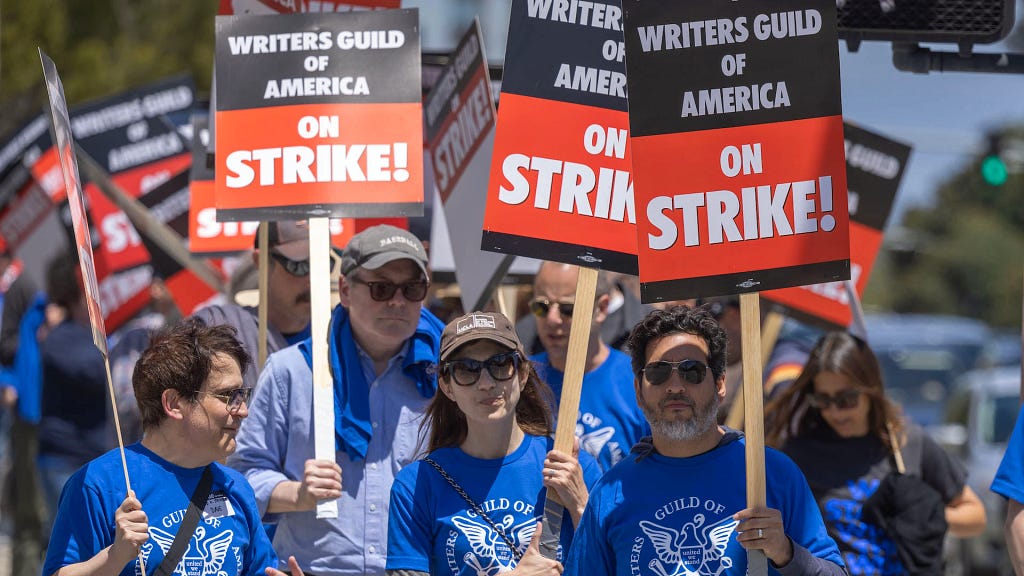How a writer’s mindset transforms into grindset and walking the line becomes a networking opportunity.

From The Ankler:
My first day of picketing was at Netflix. I walked over alone, but I wasn’t worried. It was Week One which meant a big turnout, and I figured I’d run into someone I knew. Barring that, I’d use the surefire friend-making strategy that’s worked for me since third grade: find the least threatening person and glom onto them until your co-dependent bond eventually sours into mutual recrimination.
I soon found myself talking to an affable writers’ assistant. The picket was full of younger writers, and to them I probably looked grizzled-yet-well-dressed enough to be potentially powerful and important. It felt great. Of course, it soon became clear that I wasn’t powerful and important, just grizzled, and as soon as we reached the Sunset Gower gate my strike buddy politely excused herself to get a snack. The next time we passed each other, she was talking to an actual showrunner.
I smiled and waved. I didn’t blame this woman any more than I blamed my college boyfriend who, years before, ditched me on New Year’s Eve because he got a chance to hang out with Wu-Tang Clan. Not coincidentally, he went on to have a very successful career in the entertainment business. Sometimes you have to do what you have to do. That guy had a show. A Hulu show I’d never watched, named after a meme from eight years ago because that’s how long development takes now, but a show nonetheless. All I had was a bag of Cheez-Its and war stories about getting fired from the VH1 Music Awards because I “wasn’t quite nailing Eric McCormack’s voice.”
Not only was I not offended by my erstwhile assistant friend, I was impressed. Back in ’07, when I was her age, I thought the point of the strike was to bring The Man to his knees. I didn’t realize the point of the strike was to bring The Man to his knees while simultaneously kissing the ass of a different Man. I naively believed that being a writer was about writing. I thought networking was for agents and executives and guys with MBAs who said things like “synergy” and “open the kimono” and “arbing the spread.” So in between picketing with the same three unemployed friends every day, I wrote. (On spec, of course!) In fact, I wrote what may be the worst spec script of all time, a script so bad that years later they made a Rob Schneider movie with the exact same premise. Honestly, between my scripts and horrible social skills, I don’t know how I ended up with a career at all. I think it was just easier back then.
Anyway, back to the picket line. Some people may be Quiet Quitting, but the rest of us are living through Peak Hustle culture. Rise and Grind isn’t just the name of a coffee shop on Hollywood Boulevard that I’m pretty sure is a drug front, it’s a whole mindset. A grindset, if you will. If you’re not hustling, well, you’re doing whatever the opposite of the word hustling is. My last job was a mini room for a now-canceled show on a streamer. As anyone following the strike knows, that meant it didn’t pay very well. And I can’t keep living a TV writer’s life on a Part-Time Content Creator for Greenpeace’s salary. When this is over I, like many of my fellow unemployed Guild members, will need a new job. Is the picket line a good place to try to find one? Is it a good place for new writers to get a foot in the door?
The anonymous WGA member and author of this article (using the pseudonym Kit Sargent) provides a list of pros and cons of the grindset a writer faces when walking the line … and trying to lay tracks to the next gig once the strike is over.
And it will end … someday.
For the rest of The Ankler article, go here.
For the latest updates on the strike and news resources, go here.
Peak Hustle on the Picket Line was originally published in Go Into The Story on Medium, where people are continuing the conversation by highlighting and responding to this story.
Go to Source
Author: Scott Myers
